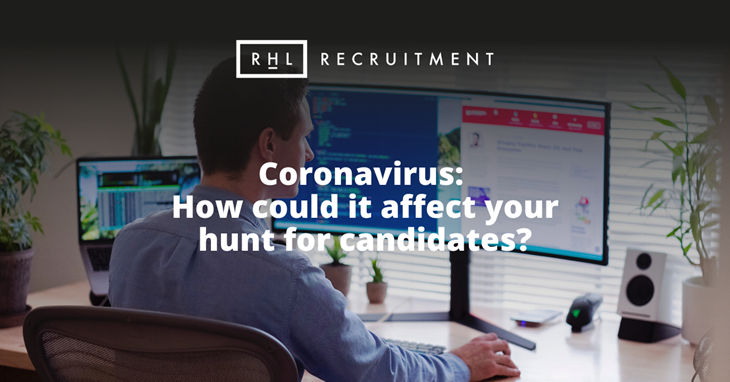Coronavirus: how could it affect your hunt for candidates?

As cases of coronavirus continue to rise in the UK, businesses are focusing on extra safety precautions to protect employees and clients.
The best way to prevent infection is to avoid exposure to the virus, so increasingly employers are encouraging staff to work from home where possible. Many are also cutting business travel and attendance at events or conferences.
But what does the coronavirus (or Covid-19) outbreak mean for your business if you’re currently recruiting new staff, where face-to-face interviews often play such a key role?
At RHL, our focus is on making sure that nothing we do as a recruitment agency puts employees, candidates and clients at risk - and we’re constantly monitoring the latest advice and guidance from global health experts and industry bodies.
While it’s hard to predict the next few months, here’s our current initial advice on the recruitment process as we enter challenging times.
Less face-to-face interviews
Since the virus is spread through coughing, sneezing and touching contaminated surfaces, meeting candidates in person clearly poses more issues going forward.
At the time of writing, global brands including LinkedIn, Facebook, Google and Amazon have all either made all job interviews virtual or cut down on the number of in-person interviews (and many others are bound to follow).
Even before the coronavirus outbreak, video interviewing has played a key role in recruitment. It’s easy, convenient and crucially involves zero person-to-person contact.
That’s why we’re prepping our clients in the technical sectors we recruit for at RHL to conduct more video interviews in the next few months as a way not to lose out on the best candidates. The good news is that many of are already used to interviewing - and holding off-site client meetings - this way and have seen the benefits first hand.
Clarity with candidates
Public health experts are urging anyone with suspected symptoms of coronavirus (which include a fever, cough and dificulty breathing) to stay at home. The same advice goes for people who may have been in close contact with someone already diagnosed, or who have travelled from a high-risk region in the last 14 days.
Yet there’s always the danger that a candidate who does feel unwell or feel they’ve been exposed to risk wants to press ahead with an interview regardless.
LinkedIn is offering candidates the option to reschedule interviews until they can safely come on site in the future, with the reassurance that if they decide to postpone it won’t affect their job chances – which sounds like a wise move.
Minimise in-person risks
If your business is conducting face-to-face interviews, do all you can to reassure candidates before they turn up to your workplace.
They’ll appreciate hearing that your business is monitoring the latest health guidance to protect your existing employees and you’re taking the right precautions to keep everyone as safe as possible.
Experts recommend avoiding shaking hands, and advise staying at least 1m from each other. The coronavirus crisis means getting used to new norms - and communicating these up front to candidates will make the situation less awkward all round.
Take hygiene seriously
Hand washing is a crucial defence against coronavirus. So make sure candidates have easy access to running water, soap and paper towels, and offer alcohol-based hand sanitizers (if you can get hold of it) throughout the workplace. Again, these are steps to reassure candidates that you’re a responsible employer - as well as minimise your own workforce’s exposure to the virus.
New times
There’s no doubt that coronavirus is posing challenges to all organisations right now. And these disruptions may make it slightly harder or mean it takes a little longer to recruit.
But there are still roles to fill and stellar candidates to find. And the steps you take to protect current and future staff as the world navigates unchartered waters will signal what type of employer you may shape up to be in healthier times.
More information
Find the UK government’s guidance for employers and businesses on COVID-19 here.
